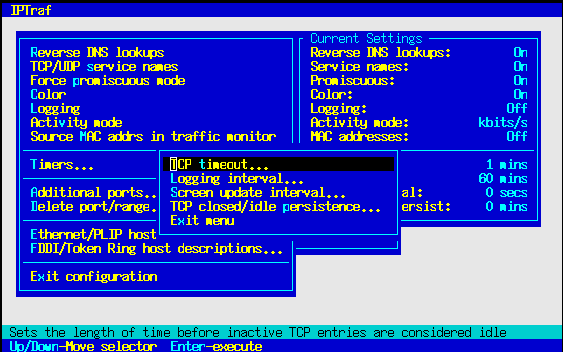Timers
The Timers... submenu allows you to IPTraf's interval and timeout functions.
TCP Timeout
This figure determines the amount of time (in minutes) a connection entry may remain idle before it becomes eligible for replacement by a new connection. The default is 15 minutes. You may want to reduce this on an isolated (not connected to the Internet) LAN or a LAN connected to the Internet with high-speed links. Just enter the new value and press Enter. You can press Ctrl+X to leave the current value unchanged.
Log Interval
This figure determines the number of minutes between logging of interface statistics, TCP/UDP figures, and LAN host statistics. The default is 60 minutes. This figure is meaningless if logging is disabled.
Screen Update Interval
This value determines the rate in seconds at which the screen is updated. The default is 0, which means the screen is updated as fast as possible, giving close-to-realtime reflection of network activity. However, this high-speed update can cause incredible amounts of traffic if IPTraf is run on a remote terminal (e.g. a Telnet or Secure Shell session). You can set this to a higher value, such as 1 or 2 seconds to slow down the updates.
This figure does not affect the rate of data capture. Only the screen refresh is affected. The figures are still updated as fast as possible, although the figure display will no longer be as close to realtime.
The default setting is 0, which shouldn't be a problem on the console. Set it to a slightly higher value on remote terminals or slow links. The setting affects all monitoring facilities.
 | Note |
|---|---|
Updating the screen is one of the slowest operations in a program. Older versions of IPTraf had a problem once network activity became very high. Because each packet caused a screen update, IPTraf began spending more time with the screen updates, causing a loss of packets once network activity reached a certain point. However, since many users like rapid counts on their screen, a compromise was incorporated. Even when the screen update interval is set to 0, there is still a 50ms delay between screen updates (except the LAN station monitor, which has a 100 ms delay). This is still visually fast, but provides more time to the packet capture routine. Higher delays may result in better accuracy of counts and activity. In any case, this setting only affects screen updates. Capture still proceeds as fast as possible. |
TCP closed/idle persistence
This parameter determines the interval (in minutes) at which the IP Traffic Monitor clears from the TCP display window all closed, idle, and timed out entries. Enter 0 to keep such entries on the screen indefinitely, disappearing only when replaced by new connections.
 | Note |
|---|---|
The TCP timeout... option only tells IPTraf how long it should take before a connection should be considered idle and open to replacement by new connections. This does not determine how long it remains onscreen. The TCP closed/idle persistence... parameter flushes entries that have been idle for the number of minutes defined by the TCP timeout... option. |
